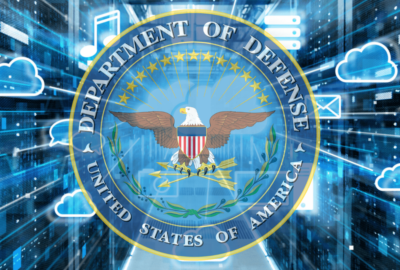

Lawmakers from both sides of the aisle, the new DoD Secretary and the president continue to weigh-in on the Joint Enterprise Defense Infrastructure procurement...
Best listening experience is on Chrome, Firefox or Safari. Subscribe to Federal Drive’s daily audio interviews on Apple Podcasts or PodcastOne.
Now that the Court of Federal Claims ruled against Oracle in its protest of the Defense Department’s cloud computing contract known as JEDI, the battle has moved to the legislative and executive branches of government.
Since the July 12 decision, we’ve seen President Donald Trump weigh in on the Joint Enterprise Defense Infrastructure cloud procurement that could be worth $10 billion over 10 years. Trump said July 18 that he was “getting tremendous complaints about the contract with the Pentagon and with Amazon.”
He also said when he was asked about the matter during an Oval Office appearance with the Dutch prime minister, “They’re saying it wasn’t competitively bid. We’re looking at it very seriously. It’s a very big contract, one of the biggest ever given having to do with the cloud and having to do with a lot of other things.”
We’ve seen the newly minted Defense Secretary Mark Esper answer a question during his first meeting with the press:
QUESTION: The president has said he’s thinking about asking the Pentagon to look into the JEDI Cloud competition. I know you’ve only been here for a few hours but has the Pentagon had any discussions with the White House about looking into that program? He’s said he’s received, you know, some complaints from several companies.
SEC. ESPER: I’ve heard from everybody about the — the JEDI contract and that’s one of the things I want to take a hard look at.
We’ve seen a rising debate on Capitol Hill with four members of the House Armed Services Committee writing to the President telling not to intervene, and then 12 other House lawmakers and at least one Senator writing to the White House telling them to step in.
And just to add more fuel to the JEDI fire, the IT Acquisition Advisory Council (IT-AAC) released a report signed by former DoD and civilian IT executives detailing for the first time the disconnect between the solicitation and the Pentagon’s cloud strategy, the Office of Management and Budget’s Cloud Smart strategy and commercial best practices.
Tony Scott, the former federal CIO, Steve Cooper, the former Commerce and FAA CIO, John Grimes, the former DoD CIO and several other retired executive say DoD should rescind and revive JEDI’s request for proposals or create significant risk to both military data and warfighters.
Basically, welcome to Act 3 of the JEDI saga.
“Other than KC-46 tanker, when you think of perceived winner take all procurement, this is biggest one that I’ve seen that I can recall over last 20 years,” said Stan Soloway, a former DoD acquisition executive and now CEO of Celero Strategies, LLC. “I’m not surprised that there has been lot of drama because of the stakes involved, but I’m a bit surprised by nature of drama. I was never overly concerned about the conflict of interest issues. It was more about optics than actual violations. The optics are not good, but it didn’t appear they did anything wrong. As you get into technical requirements, there is more complexity to this story than many of us realized.”
Soloway called the entire procurement “messy,” to say the least.
The Defense Department is still scheduled to choose Amazon Web Services or Microsoft in mid-August as the winner of JEDI. But that will not end the drama either as another round of protests by the losing bidder is possible, and congressional scrutiny could increase through the 2020 defense authorization bill that includes provisions restricting how fast DoD can move out with JEDI.
Industry experts say there is a lot at stake for AWS and Microsoft because should JEDI get through all the remaining hurdles, the winner will have a contract that is expected to grow in terms of use year-over-year. The military services and Defense agencies will put more applications and need more storage on the infrastructure-or platform-as-a-service, and need more artificial intelligence and machine learning capabilities.
This is one major reason why JEDI has been subject to so much drama and scrutiny, experts say the value of being first in is huge.
“I’m extremely surprised this contract has not gone back and been recompeted. Most contracts that have come under far less scrutiny than this one have been brought back by agencies to cross the ‘Ts’ and dot the ‘Is,’” said Trey Hodgkins, CEO of Hodgkins Consulting and a former senior vice president of IT Alliance for Public Sector. “The department certainly held fast for this one.”
Solway said that is another big difference between this procurement and so many others, DoD has been unwavering in its strategy.
“I think this was a procurement that was being advocated, not necessarily inappropriately, by one community and perpetuated by the CIO’s office and executed by another one, the contracting,” he said. “And this other group [Defense Digital Service] is influential and had leadership support behind it. It’s an interesting study about how multiple communities in government can be so disconnected despite having similar goals.”
That disconnect came through in the IT-AAC report.
John Weiler, the executive director of the consortium and an outspoken critic of DoD’s approach to JEDI, said the goal was to show there was no “connective tissue” among JEDI and government and commercial best practices.
“Our goal is to get everyone out of the political debate around conflicts of interest and lobbying, and focus on the essence of what DoD is buying and the consequence of turning so much of their data over to commercial cloud provider,” Weiler said. “We want to stop with the hype and ask if this is really something we should do.”
The report highlights 10 reasons why JEDI and the DoD, OMB and commercial best practices are at odds, ranging from security to private sector innovation to cross-platform interoperability.
“The DoD Cloud Strategy has set the vision for IT modernization and made the move to the cloud clear,” the report states. “Yet the JEDI RFP undermines the entire strategy by limiting access to innovation; requiring a static cloud environment without on-ramps for new providers and technologies; and failing to recognize the role of software-as-a-service (SaaS).”
Hodgkins said highlighting this disconnect may have a bigger impact on JEDI than most people would think.
“For some it’s more fuel for the fire and that’s the way it will be used. But it points out a legitimate disconnect between policy and guidance from CIO’s office and the contract the CIO’s office is marshalling,” he said. “So the question is how does JEDI fit into DoD’s strategy? The report drew attention to that question.”
Weiler said IT-AAC’s objective was just that, draw attention to the fact JEDI doesn’t reflect the CIO’s or any other documented approach and get away from the “cloud as a shiny object” syndrome.
Copyright © 2025 Federal News Network. All rights reserved. This website is not intended for users located within the European Economic Area.
Jason Miller is executive editor of Federal News Network and directs news coverage on the people, policy and programs of the federal government.
Follow @jmillerWFED


